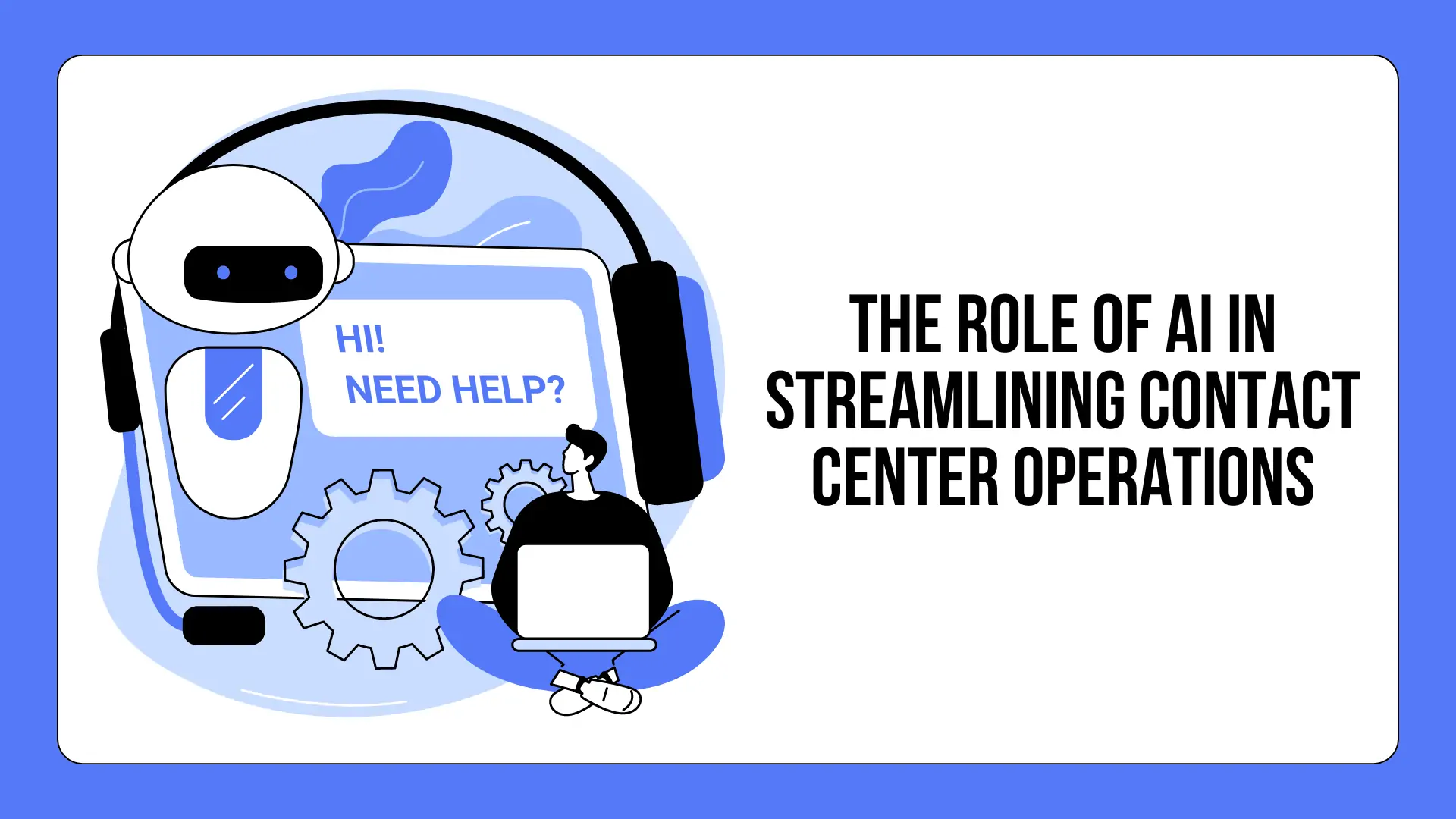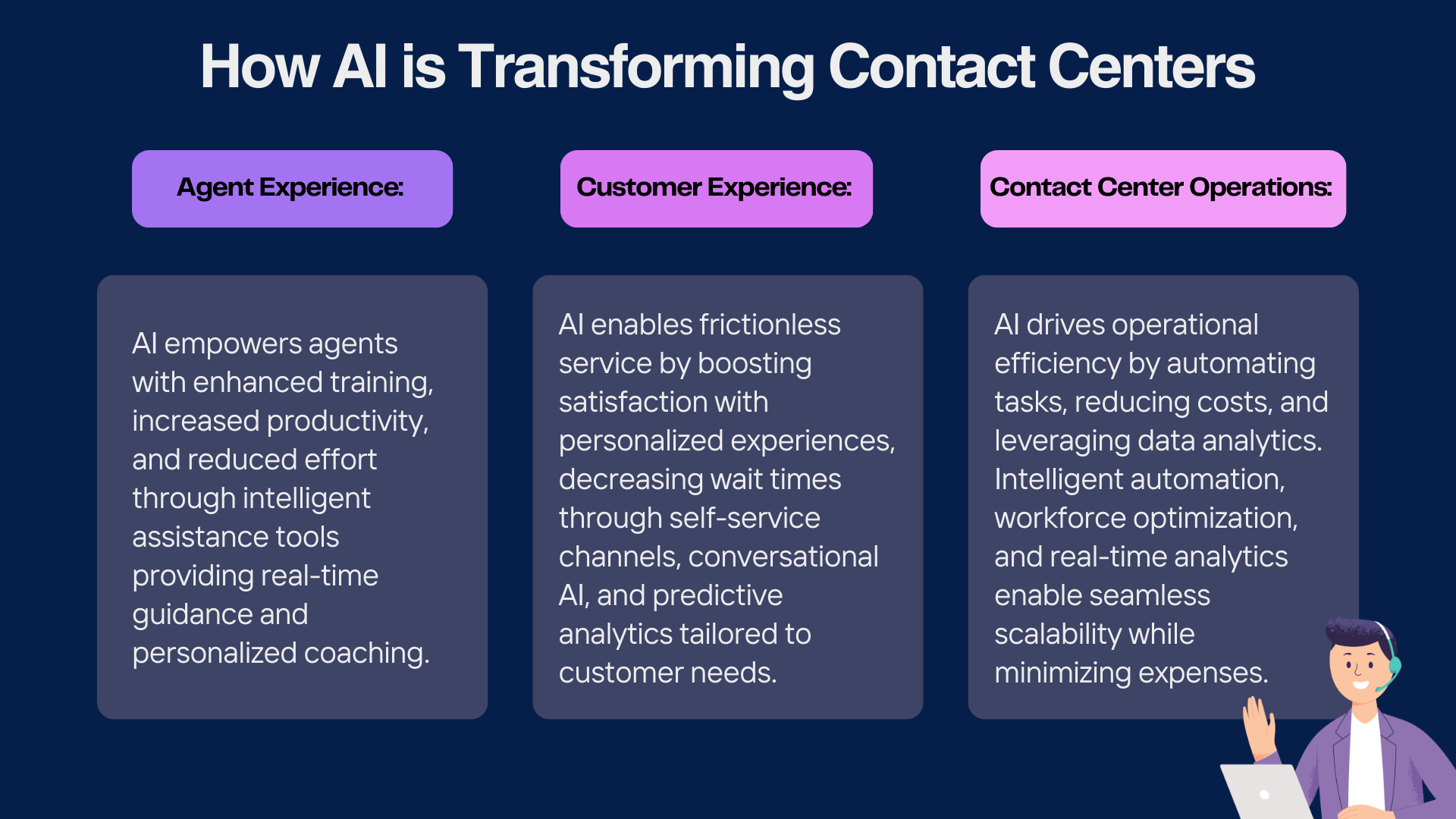
The Role of AI in Streamlining Contact Center Operations
What if your contact center could handle routine tasks and empower customers to solve problems on their own? AI is making it a reality.
In today’s digital age, exceptional customer service is no longer a competitive advantage, it’s an absolute necessity. Contact centers serve as the front line for many businesses, acting as a crucial touchpoint for customer inquiries, complaints, and requests.
As customer expectations for prompt and effective service continue to rise, contact centers are constantly seeking innovative ways to improve efficiency and deliver exceptional experiences. This is where Artificial Intelligence (AI) emerges as a powerful game-changer.
By harnessing AI capabilities, contact centers are poised to revolutionize their operations, streamline processes, and deliver exceptional customer experiences.
Enhancing Customer Self-Service Capabilities
One of the most significant advantages of AI in contact centers is its ability to enhance customer self-service capabilities. 70% of customers prefer to use a company’s website to get answers to their questions rather than use phone or email, highlighting the growing demand for convenient and immediate solutions. AI-powered tools like chatbots and voice assistants are stepping up to handle these routine inquiries with remarkable efficiency.
These AI-enabled self-service channels can provide accurate responses to common questions, reducing customer wait times and freeing up human agents to focus on more complex issues. Additionally, advanced Interactive Voice Response (IVR) systems, powered by AI, can guide customers through self-service options, further enhancing efficiency and customer satisfaction.
By empowering customers to find answers independently, AI-powered self-service aligns perfectly with their preferences and reduces the burden on contact centers. This not only improves customer satisfaction but also allows agents to dedicate their time and expertise to resolving more intricate issues.
Automating Routine Tasks
Beyond self-service, AI is also revolutionizing contact center operations by automating routine tasks. With the ability to handle repetitive processes like call routing and data entry, AI-driven workflow automation solutions, also known as call center automation ai, are empowering human agents to concentrate on higher-value activities.
These call center automation AI systems leverage machine learning algorithms and natural language processing to continuously learn and adapt to evolving patterns and workflows. By offloading mundane, repetitive tasks to AI, human agents can focus on more complex customer interactions that require empathy, critical thinking, and problem-solving skills.
Moreover, AI-enabled workforce management tools can predict call volumes and optimize staff schedules, ensuring adequate coverage during peak times. This intelligent resource optimization not only enhances operational efficiency but also contributes to cost savings and improved customer experiences.
AI-Driven Customer Insights
AI’s capabilities extend far beyond task automation. By analyzing customer interactions in real-time, AI solutions can extract valuable insights, enabling proactive decision-making and personalized customer experiences.
Through sentiment analysis, natural language processing (NLP), and advanced analytics, AI can gauge customer sentiment, identify pain points, and tailor responses accordingly. For instance, AI can analyze a customer’s past purchase history and recommend relevant products or services during a live chat interaction.
This data-driven approach not only improves customer relations and loyalty but also guides strategic decision-making, ensuring that contact centers remain agile and responsive to evolving customer needs.
Enhancing Agent Performance
AI’s transformative impact extends beyond the customer experience; it also empowers contact center agents to perform at their best. By providing intelligent assistance, AI tools can suggest relevant information and recommended responses in real-time, enhancing agents’ efficiency and effectiveness.
Furthermore, AI-driven performance monitoring systems can continuously assess agent interactions, offering detailed analytics and identifying areas for improvement. This data-driven approach to training and development ensures that agents consistently deliver high-quality service, fostering a culture of continuous improvement.
Cost Reduction and Efficiency Gains
The benefits of AI in contact centers go beyond operational streamlining and customer satisfaction. By automating tasks, optimizing resource allocation, and enabling scalable solutions, AI drives significant cost savings and efficiency gains.
| AI Integration Benefit | Impact |
|---|---|
| Operational Cost Savings | Reducing costs through automation and efficient resource management, minimizing the need for extensive human oversight. |
| Scalability | Enabling contact centers to scale operations without a proportional increase in staff, adapting seamlessly to varying call volumes. |
| Labor Cost Savings | Conversational AI is projected to save contact centers a significant amount in labor costs in the coming years. |
As AI continues to evolve, its potential to drive cost savings and operational efficiency in contact centers will only grow, positioning organizations for long-term success in an increasingly competitive landscape.
Ethical and Practical Considerations
While AI offers a treasure trove of benefits for contact centers, it’s crucial to address the ethical and practical considerations surrounding its implementation. Here’s a closer look at some key aspects to consider:
Ethical Considerations:
Transparency and User Trust: Customers deserve to know when they’re interacting with AI. Be transparent about AI use and clearly communicate limitations. Building trust is essential for positive customer experiences.
Data Privacy and Security: AI relies heavily on customer data. Robust security measures must be in place to protect sensitive information and comply with data privacy regulations.
Algorithmic Bias: AI algorithms can perpetuate biases present in the data they’re trained on. Regularly audit AI systems to mitigate bias and ensure fair treatment for all customers.
Human Oversight and Accountability: AI shouldn’t replace human interaction entirely. Complex issues or situations requiring empathy still require a human touch. Maintain a balance between AI automation and human oversight, ensuring clear lines of accountability.
Practical Considerations:
Change Management and Employee Training: Introducing AI can impact workflows and roles. Invest in change management initiatives and provide comprehensive training to ensure employee buy-in and successful adoption.
Scalability and Integration: Consider how AI solutions will integrate with existing systems and infrastructure. Ensure scalability to accommodate future growth and changing needs.
Return on Investment (ROI): Carefully evaluate the cost of AI implementation and ongoing maintenance. Measure the ROI by tracking key metrics like customer satisfaction, agent productivity, and cost savings.
By carefully considering these ethical and practical aspects, contact centers can leverage AI responsibly and strategically. This ensures AI becomes a powerful tool for enhancing customer experiences, empowering agents, and achieving long-term success.
Frequently Asked Questions
What are the cost benefits of integrating AI in contact centers?
AI helps reduce operational costs by automating repetitive tasks, optimizing resource allocation, and enabling scalable solutions that handle increased call volumes without additional staffing.
How do AI-driven analytics benefit contact center operations?
AI-driven analytics provide real-time insights into customer behavior and operational performance, enabling contact centers to make informed decisions, personalize customer interactions, and improve overall service quality.
Can AI completely replace human agents in contact centers?
While AI can automate many routine tasks, human agents remain essential for addressing complex issues and providing personalized service. A hybrid approach that combines AI and human capabilities is recommended for optimal customer experiences.
Conclusion
In the ever-evolving landscape of customer service, AI is not just a tool for streamlining operations; it’s a game-changer for the entire contact center industry. From enhancing customer self-service to driving significant cost savings, the benefits are substantial and far-reaching. As we continue to embrace these advancements, the future of customer service looks brighter than ever.
To stay ahead of the curve and capitalize on the transformative potential of AI, contact centers must adopt a strategic and holistic approach. By seamlessly integrating AI solutions, fostering a culture of innovation, and prioritizing ethical considerations, organizations can unlock a world of possibilities and deliver exceptional customer experiences at every touchpoint.




